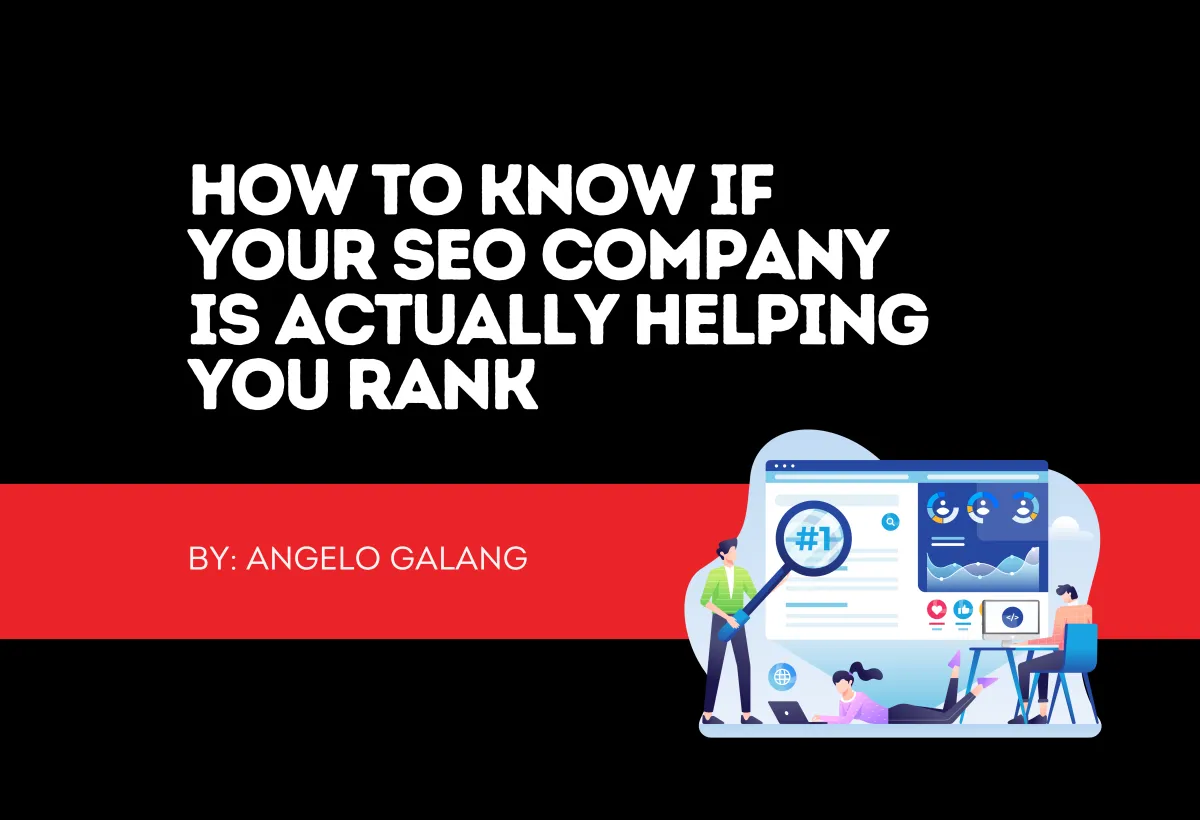
How to Know If Your SEO Company Is Actually Helping You Rank
Are you investing in vehicle rental SEO services but still unsure if it's moving the needle? Vehicle rental business owners deserve complete clarity on whether their SEO agency is actually improving rankings and bookings. In a competitive field where visibility directly impacts rental volume, your investment should deliver measurable results. This guide drills into the key performance areas—organic traffic, keyword positioning, reporting, backlinks, and on-page efforts—to help you evaluate your SEO partner with confidence. You’ll walk away knowing exactly what to check, how to check it, and when to push for accountability.
Why Monitoring Your SEO Progress Matters
A hands-off approach to SEO is risky—especially when your site's performance affects your bottom line. Here's why you need to stay hands-on:
Avoid wasted investment
Monthly retainers add up. Without tracking metrics tied to your bookings, you could end up paying for traffic that doesn’t convert.Prevent black-hat or outdated tactics
Using shady link schemes or keyword stuffing might deliver short gains, but inevitably leads to penalties. Monitoring helps catch this early.Align with seasonal trends
Vehicle rentals surge around holidays, school breaks, and travel seasons. Your SEO should reflect these peaks—if not, you're missing key opportunities.Maintain agency engagement
When you ask questions and set goals, your SEO team stays proactive instead of just reporting month-to-month.
Understanding what to monitor is critical. Let’s dive deeper into the first key metric: organic traffic.
Check Your Organic Traffic
Organic traffic—users arriving through unpaid search results—is your SEO heartbeat. It's more important than just seeing the numbers rise. Booming organic sessions signal increased visibility. A decrease might mean ranking drops, poor content, or technical issues.
Key tools to use
Google Analytics: Check Sessions, Users, Bounce Rate, Avg. Session Duration, and which landing pages get visits.
Google Search Console: Analyze Clicks, Impressions, Avg. Position, Click-Through Rate (CTR), and the queries bringing traffic.
Metrics to monitor
Sessions & Users: Compare month-over-month and year-over-year. A sustainable rise over six months suggests lasting SEO gains.
Bounce Rate & Time on Page: High bounce rates on your booking page (e.g., above 80%) could indicate slow loading, poor UX, or irrelevant traffic.
Top Landing Pages: Are your main service or city-specific pages attracting traffic? If yes, your targeting is working.
To gain meaningful insights, it's essential to compare traffic trends across longer time periods rather than relying on short-term spikes from individual campaigns or seasonal promotions. Sustained, long-term growth offers a more accurate picture of your SEO strategy's effectiveness. Additionally, segmenting your data by geography is crucial for vehicle rental businesses with multiple locations. Filtering traffic by specific cities allows you to assess the impact of your local SEO efforts and adjust strategies based on location-specific performance.
Action Tip:
Export monthly metrics and plot them. If traffic dips, even slightly, reach out to your agency and request an in-depth analysis—did a technical issue appear? Was a core update released?
Traffic is a great sign—but which keywords are driving it?

Monitor Keyword Rankings
While traffic numbers give you a big-picture view, keyword rankings reveal why that traffic is (or isn’t) showing up. Monitoring your site’s position in search engine results for relevant vehicle rental terms is one of the most direct ways to measure SEO effectiveness. When your business ranks higher for the phrases your ideal customers are actually searching—like “vehicle rental near [location]” or “SUV rental airport”—you increase visibility, attract more clicks, and improve the chances of turning visitors into bookings. Without consistent tracking, you could be missing major opportunities or overlooking sudden drops that affect your bottom line. Here are the things that can be done to maintain and monitor your rankings.
Choose relevant keywords.
Cover three tiers:Primary terms: e.g., “vehicle rental [city]”, “airport car hire”
Secondary long-tail: e.g., “one-way vehicle rental toronto”, “cheap SUV for weekend trip”
Brand + intent: e.g., “[YourBrand] vehicle rental”, “vehicle rental promo code [airport]”
Use tools like SEMrush or Ahrefs.
These platforms let you monitor ranking changes, analyze SERP features (like map packs or featured snippets), and shortlist featured opportunities.Understand normal fluctuations.
Even a 2–3 spot shift weekly can be normal. But if a keyword drops from page 1 to 3+ for weeks, that’s a red flag—ask for reasoning.Competitor comparison.
Track 3–5 local competitors. Tools show side-by-side rankings so you can pinpoint where your competitors are outperforming you—use this insight to focus content or link efforts on losing ground.
Tracking matters—but how your agency communicates the data is what makes or breaks its value.
Review Monthly Reports
A good SEO report should be easy to understand and clearly show how your website is performing. Instead of confusing you with technical jargon or vague numbers, it should explain what’s working, what needs improvement, and what steps are planned next. Think of it as a roadmap—it guides your strategy, tracks your progress, and helps you make informed decisions about your marketing investment.
What should it include?
Traffic & Rankings Overview: Clear visuals showing progress and context.
Conversion Metrics: Lead forms, phone calls, bookings linked to organic traffic.
Backlink Summary: Number of new links, their domain authority, relevance.
Technical & On-Page Changes: What was updated—meta tags, speed, mobile usability.
Red flags to watch for
Vague info: Reports stating “traffic is up” without numbers are useless.
Technical overload: Jargon without business context (e.g., PageSpeed drastically improved, but why does that matter to you?).
Missing next steps: If there are no goals or planned actions for the next month, it shows a reactive, not strategic, approach.
Questions to always ask
“Which keywords are driving the most conversions this month?”
“Why did we see a traffic dip on [specific page]?”
“How is our backlink quality trending?”
“What’s our content plan next month?”
Monthly insights are crucial, but strategy should include off-page trust signals too.
Audit Backlink Quality
Backlinks are like votes of confidence for your website. When other reputable sites link to yours, search engines see it as a signal that your content is valuable and trustworthy. This can significantly boost your domain authority and improve your rankings. However, not all backlinks are helpful—poor-quality links can actually hurt your visibility.
To evaluate backlink quality, start by looking at where the links are coming from. The best sources include local tourism boards, chambers of commerce, respected travel blogs, and other industry-related websites. Tools like Ahrefs or Majestic can help you analyze each link’s domain authority and trust flow, making it easier to identify which backlinks are helping your SEO—and which might be holding it back.
How Can You Spot Red Flags?
Links from irrelevant content hubs (e.g., unrelated topics like pet blogs)
Sudden spike in low-quality links with identical anchor text (“cheap vehicle rental”)
Links flagged as toxic or on Google’s disavow list
Use tools expertly
For each new backlink, check:
Domain authority (Moz), Trust Flow (Majestic)
Relevance to your niche or region
Anchor text diversity—avoid keyword stuffing anchors
While great backlinks build domain authority, great on-page SEO ensures your pages deliver relevancy and experience.
Inspect On‑Page Changes
On-page SEO is where all the elements of your website—content, structure, and performance—come together to create a smooth, relevant experience for both users and search engines. It ensures that your pages are not only easy to navigate and fast to load but also optimized with the right keywords and messaging to convert visitors into customers. When done correctly, on-page SEO helps your site rank higher, engage users longer, and drive more bookings.
Content updates to track
New service/location pages: If your agency promised a Toronto location, check for such a page.
FAQs & Blogs: Helpful content that answers popular traveler questions (e.g., “What documents do I need to rent a car in Ontario?”).
Calls-to-action: Clear directives like “Book airport pickup” improve conversion potential.
Meta tag & header optimization
Title tags and H1s should reflect target keywords but remain reader-friendly. Meta descriptions need a CTA or value proposition to improve CTR.
Technical enhancements to verify
Page speed: Use tools like PageSpeed Insights to confirm load times have improved.
Mobile-friendliness: Use Google’s mobile usability reports—no errors allowed.
Schema markup: Business info, ratings, and booking schema help search engines showcase your services.
How to Verify On-Page Changes
It’s not enough for your SEO agency to say they’ve optimized your site—you should be able to confirm these updates yourself. Verifying on-page changes ensures that promised improvements are actually in place and working as intended.
Use site audit tools: Platforms like Screaming Frog, Sitebulb, or SEOptimer allow you to crawl your website and check for updates to meta tags, header structures, internal links, and more. These tools give a snapshot of your site’s current SEO setup.
Check speed and mobile performance: Use Google’s PageSpeed Insights or GTmetrix to verify whether your site’s loading time and mobile usability have improved. Look for higher scores and reduced load times on both desktop and mobile.
Review content manually: Visit newly optimized pages and compare them to older versions if available. Look for improved headings, more targeted content, keyword usage, and clear calls-to-action.
Request a changelog from your agency: A professional SEO provider should be able to show a list of updates made each month, from content revisions to technical enhancements.
Confirm schema implementation: Use Google’s Rich Results Test or Schema Markup Validator to check if structured data like business info, reviews, and service details are properly embedded and readable by search engines.
By routinely verifying these changes, you not only hold your SEO agency accountable but also gain deeper insight into how your site is evolving and improving over time.
Elevating Your SEO Oversight
Monitoring your SEO performance doesn’t have to be overwhelming. With the right focus, it becomes a simple, strategic routine:
Weekly: Check Google Analytics and Search Console for sudden issues or drops.
Monthly: Review keyword rankings and backlinks.
Quarterly: Do a technical audit (crawl for errors, speed checks, schema verification).
Annually: Update your SEO strategy to match business goals, location expansions, or new service offerings.
Checklist example:
✅ Organic traffic up month-over-month and year-over-year?
✅ Are we ranking top 3 for at least half of primary keywords?
✅ Do we have 3–5 high-quality links per quarter?
✅ Are technical issues (404s, mobile errors) zeroed out?
✅ Do monthly reports include conversions, insights, and next steps?
Consistent performance—and accountability—should tell you one thing: your SEO is working.
Why FLEET SEO Is the Right SEO Partner for Your Vehicle Rental Business
At FLEET SEO, we specialize exclusively in helping vehicle rental companies grow through strategic, transparent SEO. Unlike general agencies, we understand your industry's challenges and what it takes to rank locally and convert traffic into bookings.
What Sets Us Apart
Industry-Specific Expertise: Our entire focus is on vehicle rental businesses, so every tactic we use is purpose-built for your market.
Custom Websites That Convert: We build fast, secure, and SEO-friendly websites designed to turn visitors into paying customers.
Local SEO That Delivers: From airport listings to tourist zones, we ensure your business ranks where high-intent customers are searching.
Backlink & Authority Growth: We secure quality links and brand mentions to build your online credibility.
Clear Reporting: Know exactly what’s working with monthly keyword tracking, lead attribution, and ROI dashboards.
Partnering with FLEET SEO means working with a team that gets results—and speaks your language. Let’s make sure your SEO is doing its job. Request a free, no-obligation audit today or call us at (804) 537-8748





